- Cedar Top
- Indian Rosewood Back and sides
- Ebony Fretboard
- Deluxe Fustero tuners, with pearloid buttons
- Scale length: 660mm
- Nut: 52mm
- Condition is good. Several repaired cracks, all well-repaired:
- treble side, about 1/4 inch off fretboard: 3 2/3 inch
- bass side, 1 1/4 inch off fretboard: 4 ¼ inch
- 1/4 inch bass side of center seam, between bridge and soundhole: 4 inches
-
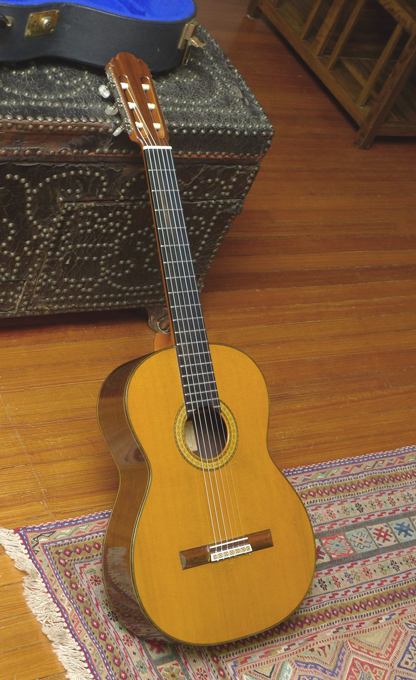 Another fine Kohno classical guitar from Masaru Kohno. This one combines a cedar top with Indian rosewood back and sides for a warm, clear tone. The best sounding Kohno 15 (or 20 for that matter) we’ve had.
Another fine Kohno classical guitar from Masaru Kohno. This one combines a cedar top with Indian rosewood back and sides for a warm, clear tone. The best sounding Kohno 15 (or 20 for that matter) we’ve had. -
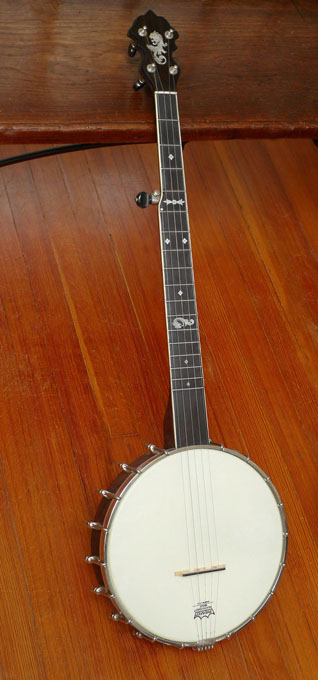 This is a one-of-a-kind custom banjo, from one of the country’s most respected luthiers, based in Appomattox, Virginia. I love this banjo for picking on the couch– it won’t put your back out, picking it up and putting it down, or crush your cat or your sweetheart. It’s lightweight, and with a custom-size head. But it packs beautiful full tone, not the tinny nasal sound from most open back banjos. It’s five or so years old, but with very little wear.
This is a one-of-a-kind custom banjo, from one of the country’s most respected luthiers, based in Appomattox, Virginia. I love this banjo for picking on the couch– it won’t put your back out, picking it up and putting it down, or crush your cat or your sweetheart. It’s lightweight, and with a custom-size head. But it packs beautiful full tone, not the tinny nasal sound from most open back banjos. It’s five or so years old, but with very little wear.- Dark stained maple rim, and neck
- 11 inch pot
- Ebony fretboard
- Engraved dragon inlay in peghead
- Custom MOP inlays
- Bound neck
- No Knot tail piece (Pat. Nov. 19 1901)
- 18 lug
- Brass hoop tone ring
- Dowell stick construction
- nut width 1-¼ inch
- scale: 25- ½ inches
- maple rim diameter: 10- ½ outside
- maple rim thickness: 7/16 inches
- Dark stained maple rim, and neck
- 11 inch pot
- Ebony fretboard
- Engraved dragon inlay in peghead
- Custom MOP inlays
- Bound neck
- No Knot tail piece (Pat. Nov. 19 1901)
- 18 lug
- Brass hoop tone ring
- Dowell stick construction
- nut width 1-¼ inch
- scale: 25-½ inches
- maple rim diameter: 10- ½ outside
- maple rim thickness: 7/16 inches
- With original case.
-
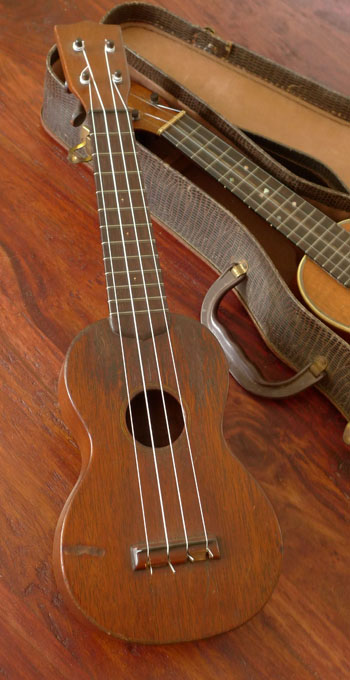 A pre-decal Uke from Martin. Style 0, with no body binding. Well worn, but 100% crack free.
A pre-decal Uke from Martin. Style 0, with no body binding. Well worn, but 100% crack free. -
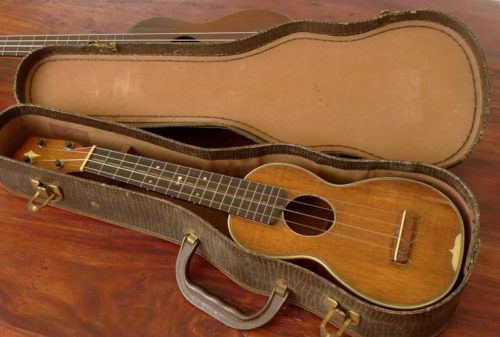 One of the first Martin 3K Ukeleles ever made. This is possibly a prototype, one of the first, all hand-made Martin 3K Ukeleles, made probably before the official introduction of the model by Martin in 1919-1920. It has many signs that it was the one of the first ones:
One of the first Martin 3K Ukeleles ever made. This is possibly a prototype, one of the first, all hand-made Martin 3K Ukeleles, made probably before the official introduction of the model by Martin in 1919-1920. It has many signs that it was the one of the first ones:- Ebony fretboard is hand-cut
- Fretboard inlays are hand-cut
- There is an "A" on the back of headstock... could be a marking by the Martin craftsmen in-house to indicate a prototype.
- Several cracks on back (repaired)
- Two cracks on top (repaired)
- There is one missing brace, a back brace, inside. Since ukeleles are so small, that brace has no real structural importance, so we decided not to replace it
- The sound hole was at some point enlarged slightly, either at the factory, or later. Probably later– so we’ll call it the Tony Rice model… this modification does add loudness
- The finish is all original.
- Original striped nut
- 3 lines inlaid down center of fingerboard.
- 7 ply side binding
- Celluloid ornament on top, behind bridge (known as the "parend").
- Small pearl paired-diamond inlays at fret 5, 7, 9– hand-cut. With the “bowtie” at the 7th fret
- Kite-shaped celluloid ornament on front of headstock
- Original friction pegs
- Ebony fretboard
- C.F. Martin & Co. stamp on back of headstock.
-
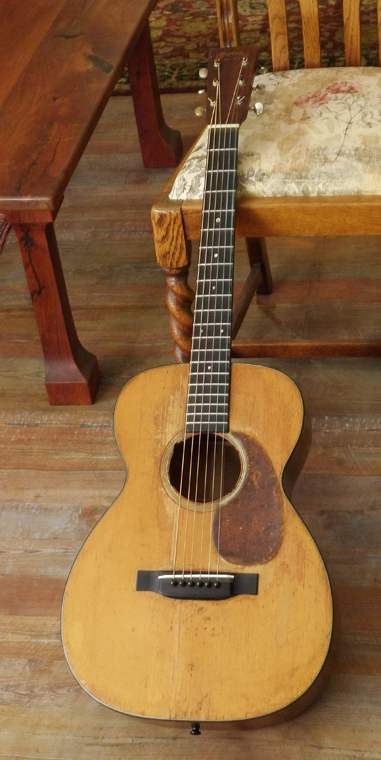 This guitar is probably among the first twenty Martins made in 1939 after the change in nut width on 14-fret models from 1 3/4" to 1 11/16", so yes it is 1 11/16. It has all original finish. Original tuners. Original maple bridge plate. It has multiple repaired cracks on top and sides (no cracks on back). Extensive play wear. New, but perfect, historically correct reproduction Ebony bridge.
This guitar is probably among the first twenty Martins made in 1939 after the change in nut width on 14-fret models from 1 3/4" to 1 11/16", so yes it is 1 11/16. It has all original finish. Original tuners. Original maple bridge plate. It has multiple repaired cracks on top and sides (no cracks on back). Extensive play wear. New, but perfect, historically correct reproduction Ebony bridge. -
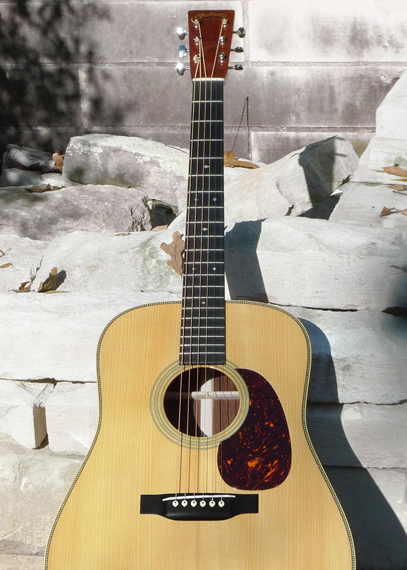 Martin has refined their “Authentic” series 1930’s recreations. When the first D-28A came out a about 5 years ago, it was Brazilian rosewood, with a price tag north of $20K. So when Martin decided to produce a Madagascar rosewood version, it was very welcome. In fact Martin learned from the earlier “Authentic” models and this guitar, one of the very first D-28 Authentics’s made with Madagascar rosewood, is a best of the breed– a recreation of the original 1937 D-28 model but now offered with Madagascar rosewood back and sides. And this instrument has a particularly good set of Madagascar.
Martin has refined their “Authentic” series 1930’s recreations. When the first D-28A came out a about 5 years ago, it was Brazilian rosewood, with a price tag north of $20K. So when Martin decided to produce a Madagascar rosewood version, it was very welcome. In fact Martin learned from the earlier “Authentic” models and this guitar, one of the very first D-28 Authentics’s made with Madagascar rosewood, is a best of the breed– a recreation of the original 1937 D-28 model but now offered with Madagascar rosewood back and sides. And this instrument has a particularly good set of Madagascar.- It’s in virtually unplayed, mint condition.
- Forward shifted hand-scalloped X-bracing
- Fingerboard Width At Nut: 1 3/4''
- Mahogany Blocks/Dovetail Neck Joint - Hide Glue
- Top: Solid Adirondack Spruce
- Top Braces: Solid Adirondack Spruce 5/16''
- Back Material: Solid Madagascar Rosewood
- Back Purfling: 28 Style Zig-Zag (Authentic)
- Side Material: Solid Madagascar Rosewood
- Neck Shape: Authentic 1937 Barrel & Heel
- Scale Length: 25.4''
- Bridge String Spacing: 2-5/16''
- Saddle: 16'' Radius/Long Bone
-
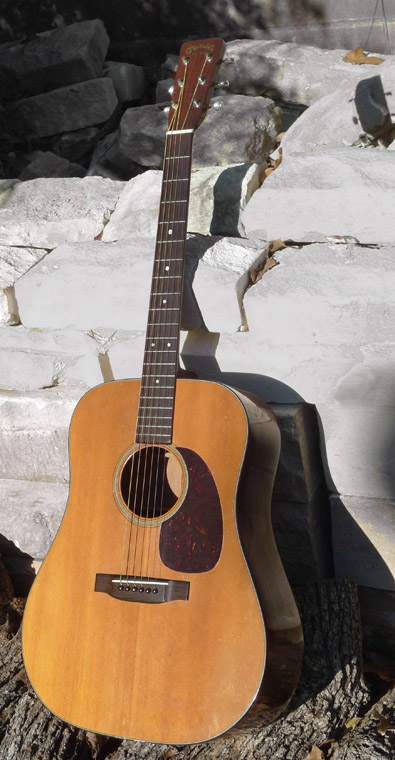 This is another great mid-fifties dread in unbelievable condition. It’s totally crack-free (also, not even a “pick guard” crack). Was acquired in 100% original condition: bridge, saddle, bridge pins, tuners, everything. Just had a neck set– resulting in great action, and tone/projection. With new condition Martin hard shell case.
This is another great mid-fifties dread in unbelievable condition. It’s totally crack-free (also, not even a “pick guard” crack). Was acquired in 100% original condition: bridge, saddle, bridge pins, tuners, everything. Just had a neck set– resulting in great action, and tone/projection. With new condition Martin hard shell case. -
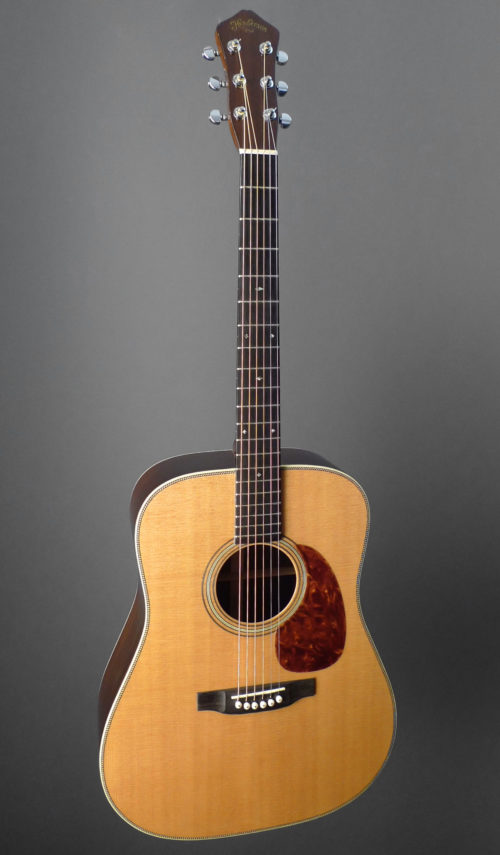 This week, to honor the just-announced winners of the 2018 Wayne Henderson Guitar Festival, we call out not an individual guitar, but rather one of the greatest American luthiers working today– and especially that luthier’s (and great player’s) work for youth in his area. We’re speaking of course of Wayne Henderson, and his legendary Festival. Every June Wayne Henderson hosts on of the most culturally important music festivals in the U.S., at the amphitheater in Grayson Highlands State Park near Henderson’s home and shop in Rugby, Virginia. The guitar- and generally music-loving attendees hear great music while supporting scholarships for young musicians in the area. And at the heart of the festival is the guitar competition. Click here to see the just-announced winners. And here’s a look at Fretboard Journal’s visit to the festival– and to Wayne Henderson’s luthier’s shop– a few years back. Click here for the article. .
This week, to honor the just-announced winners of the 2018 Wayne Henderson Guitar Festival, we call out not an individual guitar, but rather one of the greatest American luthiers working today– and especially that luthier’s (and great player’s) work for youth in his area. We’re speaking of course of Wayne Henderson, and his legendary Festival. Every June Wayne Henderson hosts on of the most culturally important music festivals in the U.S., at the amphitheater in Grayson Highlands State Park near Henderson’s home and shop in Rugby, Virginia. The guitar- and generally music-loving attendees hear great music while supporting scholarships for young musicians in the area. And at the heart of the festival is the guitar competition. Click here to see the just-announced winners. And here’s a look at Fretboard Journal’s visit to the festival– and to Wayne Henderson’s luthier’s shop– a few years back. Click here for the article. . -
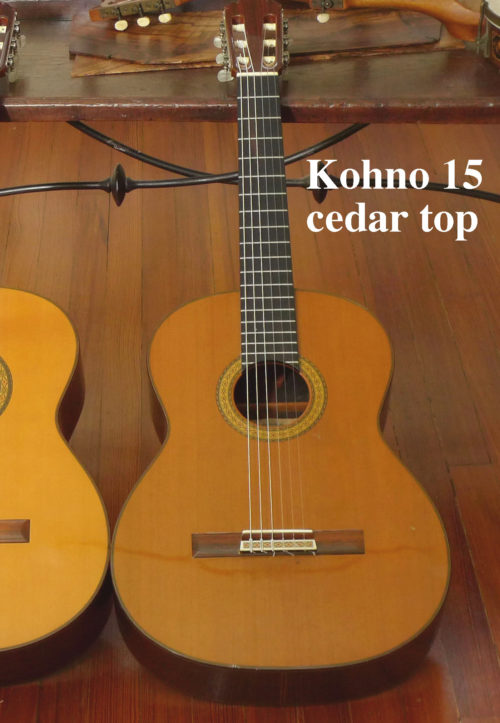 Kohno Classical Guitar. 1976 This instrument is being sold for a customer in Houston with a large collection of guitars. This guitar was originally purchased from VintageAmericanGuitar some five years ago– and its tone has aged and improved. The original Kohno design was specifically different from the high-end Spanish "concert" guitars of the day which had high action and beefy necks (and often long 664 or longer scale lengths). The Kohno necks were moderately thin in profile and shaped for very fluid playability. They’re a joy to play, physically. The 660 scale length– not overly long to begin with– actually “feels” shorter because of the neck design. (And the string spacing at the 2-inch nut: 1 11/16 inches, is also a great feature that adds to the great left hand feel.) We’ve seen/played many Kohnos– this one is unique in the combination of woods, and tone. Cedar top (not spruce), and Indian Rosewood back and sides. The combination, and this guitar’s age and unique voicing produce a dark, bass-rich tone and super clear and strong mids rarely found in a Kohno. It’s louder, darker and deeper than other Kohnos, yet is has great string separation– and the high E string is bell-like and loud.
Kohno Classical Guitar. 1976 This instrument is being sold for a customer in Houston with a large collection of guitars. This guitar was originally purchased from VintageAmericanGuitar some five years ago– and its tone has aged and improved. The original Kohno design was specifically different from the high-end Spanish "concert" guitars of the day which had high action and beefy necks (and often long 664 or longer scale lengths). The Kohno necks were moderately thin in profile and shaped for very fluid playability. They’re a joy to play, physically. The 660 scale length– not overly long to begin with– actually “feels” shorter because of the neck design. (And the string spacing at the 2-inch nut: 1 11/16 inches, is also a great feature that adds to the great left hand feel.) We’ve seen/played many Kohnos– this one is unique in the combination of woods, and tone. Cedar top (not spruce), and Indian Rosewood back and sides. The combination, and this guitar’s age and unique voicing produce a dark, bass-rich tone and super clear and strong mids rarely found in a Kohno. It’s louder, darker and deeper than other Kohnos, yet is has great string separation– and the high E string is bell-like and loud.- Solid Cedar top
- Solid Indian rosewood back and sides.
- Mahogany neck with 2 ebony strips
- Ebony fretboard
- 19 frets
- Rosewood bridge
- Gold engraved Fostero tuners. Fustero tuners are individually made by hand in Spain from the best materials…for decades they have adorned high end instruments built by Fleta, Ramirez, Kohno, Contreras, Bernabe and others.
- 660mm scale length
- 2" nut width
- String spacing at the nut: 1 11/16 inch
- Condition: One, repaired cracks:4 1/2 inches long, about 2 inches to the north (bass side) of the fretboard extension over the body.
-
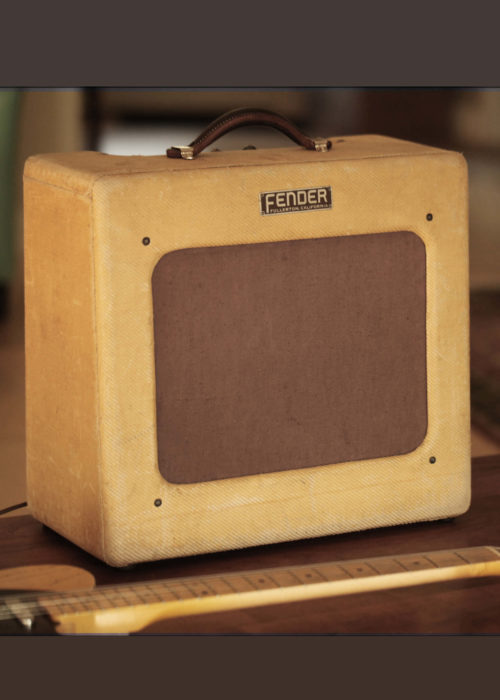 1951 Fender Deluxe Amplifier ... all it should be, and more... coming soon... . .
1951 Fender Deluxe Amplifier ... all it should be, and more... coming soon... . . -
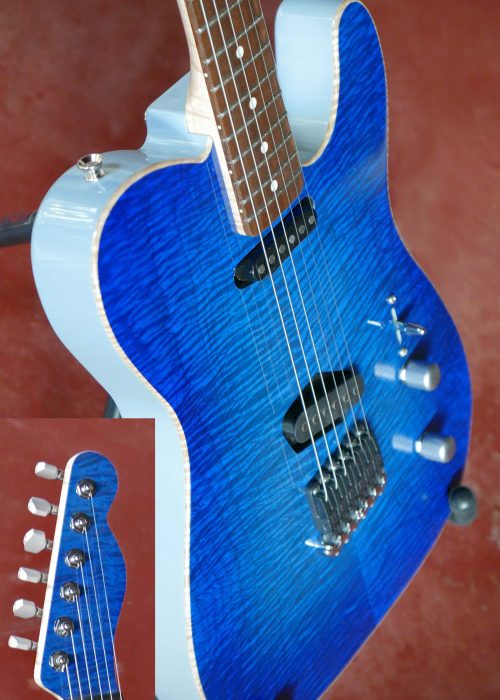 Tony Nobles "Coney Island Custom" Tele Guitar Master luthier Tony Nobles, based in Wimberly, Texas, needs little introduction. He’s been crafting custom guitars for years, quietly, without much hype, for artists ranging in style from Joe Walsh to Alejandro Escovedo. This guitar is fun, unique (it’s one of one), and draws on the DNA of some interesting sources. Starting with: the fretboard is made from rosewood salvaged from the actual Coney Island Boardwalk when they rebuilt it a few years ago. So it's a piece of history. Cut to chase on this unique guitar:
Tony Nobles "Coney Island Custom" Tele Guitar Master luthier Tony Nobles, based in Wimberly, Texas, needs little introduction. He’s been crafting custom guitars for years, quietly, without much hype, for artists ranging in style from Joe Walsh to Alejandro Escovedo. This guitar is fun, unique (it’s one of one), and draws on the DNA of some interesting sources. Starting with: the fretboard is made from rosewood salvaged from the actual Coney Island Boardwalk when they rebuilt it a few years ago. So it's a piece of history. Cut to chase on this unique guitar:- Top: bookmatched Maple; Natural Maple top binding
- Nitrocelulose lacquer finish
- Musikraft neck, maple, with rosewood fretboard made from salvaged wood from the actual Coney Island Boardwalk (when they tore down the old boardwalk for reconstruction, and the wood was preserved by architects/preservationists)
- 25.5" Scale
- Width at the Nut: 1-11/16"
- Width at the Heel: 2-3/16 (55.56mm)
- Number of Frets: 21
- Fret Type: Medium 6105
- Finger Board Radius: 10"
- Back of neck: natural, no finish
- Front of headstock, blue to match body
- Bridge: Schaller, imported from Germany, chrome
- Tuners: Sperzel Trimlok Locking Guitar Tuners 6-in-line Trim-Lok SATIN CHROME
- Volume and tone knobs: brushed satin chrome
- Pickups: Harmonic Design "54 special" for the bridge pickup; and Harmonic Design "MiniStrat" for the neck pickup
-
Out of stock
 The Larson Brothers of Chicago never marketed any guitar, throughout their long career, that was marked “Larson”. Their designs were branded by Maurer, Stahl, Prairie State, Stetson, and a few other guitar makers– but never “Larson”. They were also known for making many “off-catalog” guitars, i.e. guitars with combinations of features that varied from the Maurer, Stahl, etc, catalogs, and guitars that were not marked at all with a brand. This guitar is a Larson Bros creation that is not marked at all. It is a custom made instrument–but it has all the typical Larson hallmarks. The tone of this Larson is every bit as wonderful as the Maurer/Larson listed above, indeed it is quite similar, due to the same patented “built under tension” design, and X-bracing. This Larson does not have laminated braces (it’s well documented that laminated braces were only used on certain models–and their use was not related to level or price.) Every part of this guitar is original, including original finish. There are two repaired cracks on the back, and three small, repaired cracks on top.
The Larson Brothers of Chicago never marketed any guitar, throughout their long career, that was marked “Larson”. Their designs were branded by Maurer, Stahl, Prairie State, Stetson, and a few other guitar makers– but never “Larson”. They were also known for making many “off-catalog” guitars, i.e. guitars with combinations of features that varied from the Maurer, Stahl, etc, catalogs, and guitars that were not marked at all with a brand. This guitar is a Larson Bros creation that is not marked at all. It is a custom made instrument–but it has all the typical Larson hallmarks. The tone of this Larson is every bit as wonderful as the Maurer/Larson listed above, indeed it is quite similar, due to the same patented “built under tension” design, and X-bracing. This Larson does not have laminated braces (it’s well documented that laminated braces were only used on certain models–and their use was not related to level or price.) Every part of this guitar is original, including original finish. There are two repaired cracks on the back, and three small, repaired cracks on top.- Lower bout width: 12 5/8 inches
- Brazilian rosewood back and sides
- Ivory celluloid Bound fretboard
- Ivory celluloid Bound headstock
- Spruce top
- X braced
- Larson’s patented “built under tension” design
- Rosette: Abalone pearl and wood inlay bordering the sound hole
- Radiused ebony fingerboard, and Classic Larson Brothers’ “ebony below the binding”
- Engraved inlays on fretboard
- Original tuners
- Original ebony bridge
- Original bridge pins
- 1-7/8" wide nut
- 2 1/4" bridge string spacing
- 24.3" scale length
- One-piece mahogany neck, round C shaped neck profile.